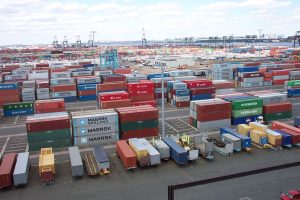In the logistics and transportation industry, overdue freight charges can significantly impact cash flow and overall financial stability. Effective debt recovery strategies are essential for businesses to manage and reclaim outstanding debts. This article explores various approaches to debt recovery, from understanding legal frameworks to leveraging third-party services. By implementing these strategies, companies can improve their chances of recovering debts and maintaining a healthy financial status.
Key Takeaways
- Understanding the legal intricacies of freight contracts and international conventions is crucial for effective debt recovery in cross-border transactions.
- Proactive risk mitigation through credit checks and clear payment terms can prevent overdue charges and simplify debt recovery processes.
- Amicable settlements through negotiation, payment plans, and alternative dispute resolution can maintain business relationships while recovering debts.
- Legal actions, including demand letters, court claims, and asset liens, are necessary enforcement tools for recalcitrant debtors.
- Third-party services such as debt collection agencies, credit insurance, and factoring provide additional support and financial solutions for debt recovery.
Understanding the Legal Framework for Debt Recovery
Assessing the Terms of the Freight Contract
Before we dive into recovery, we scrutinize the freight contract. It’s the blueprint for what’s owed and what’s enforceable. Key clauses determine our leverage in debt recovery. We’re talking payment terms, late fees, and jurisdiction.
- Review payment terms and due dates
- Clarify late payment penalties
- Confirm jurisdiction and governing law
Ensuring clarity in these areas paves the way for straightforward debt recovery.
We must understand every line. It’s not just about what’s written, but also what’s implied. This initial step is crucial for setting the stage for any subsequent recovery actions.
Navigating Through Transport and Commercial Law
We must be adept at navigating the complex web of transport and commercial law. Understanding these laws is crucial for recovering overdue freight charges. Different jurisdictions can have vastly different regulations, and being well-versed in these can make or break our debt recovery efforts.
Transport law often intersects with commercial practices, and we need to be aware of both to effectively manage debt recovery. For instance, the laws governing maritime shipments differ from those for overland transport. Here’s a quick checklist to keep us on track:
- Familiarize with the applicable transport laws based on the mode of shipment.
- Understand the commercial laws that govern transactions in the debtor’s jurisdiction.
- Stay updated on any changes in legislation that might affect debt recovery.
It’s not just about knowing the law; it’s about applying it strategically to ensure we recover what’s owed to us.
By mastering these legal nuances, we can approach debt recovery with confidence and precision, minimizing the risk of legal setbacks.
Leveraging International Conventions for Cross-Border Debt
When we’re faced with overdue freight charges that cross borders, we must navigate a complex web of international laws and conventions. Our strategy hinges on a deep understanding of these frameworks, ensuring we’re equipped to recover debts globally. We prioritize preventive credit management and seek out professional services to bolster our efforts.
International treaties play a pivotal role in our approach. They provide a standardized legal ground that can be invoked when dealing with debtors from different jurisdictions. Here’s how we tackle it:
- Familiarize ourselves with relevant conventions such as the CMR for road transport or the Rotterdam Rules for maritime shipping.
- Assess the enforceability of these conventions in the debtor’s country.
- Determine the most effective legal recourse based on the applicable international law.
We don’t let international borders deter us. Our proactive stance and thorough preparation pave the way for successful debt recovery, regardless of where the debtor resides.
Implementing Proactive Measures to Mitigate Risk
Conducting Credit Checks on Clients
Before we extend credit, we must scrutinize the financial health of our clients. Credit checks are non-negotiable; they’re the bedrock of risk management. We delve into credit history, assess payment behaviors, and gauge overall reliability.
Transparency is key. We communicate our findings and concerns, fostering a relationship built on mutual trust. This proactive client engagement minimizes surprises and cements our reputation as a dependable partner.
- Review credit reports
- Analyze payment history
- Evaluate financial stability
By conducting thorough credit checks, we not only protect our assets but also signal to our clients that we value responsible financial practices.
Setting Clear Payment Terms and Conditions
We must establish unequivocal payment terms from the outset. This clarity is the cornerstone of a healthy financial relationship with our clients. By doing so, we mitigate risks and set the stage for smoother operations.
- Define payment deadlines clearly
- Specify acceptable payment methods
- Outline consequences for late payments
Ensuring that our payment terms are understood and agreed upon prevents misunderstandings and fosters a sense of mutual respect.
We also recommend regular reviews of these terms to adapt to any changes in the business environment or client profiles. It’s about finding a balance between firmness and flexibility to maintain positive client relations while safeguarding our financial interests.
Utilizing Technology for Payment Tracking and Reminders
In our quest to streamline debt recovery, we’ve embraced technology as our ally. Automated invoicing systems ensure that billing is timely and accurate, eliminating human error and the lag of manual processing. We maintain comprehensive records of all transactions, which not only simplifies the follow-up process but also strengthens our position should legal action become necessary.
By leveraging data analytics, we can identify high-risk clients early on and tailor our approach accordingly.
The use of digital platforms facilitates seamless communication with our clients. Payment reminders are sent automatically, reducing the need for repetitive manual tasks and allowing us to focus on more strategic aspects of our business. This proactive approach minimizes the risk of overdue freight charges and keeps cash flow healthy.
- Implement automated invoicing and payment systems
- Utilize data analytics to assess client risk
- Employ digital platforms for efficient communication
Negotiation Tactics for Amicable Settlements
Engaging in Effective Communication with Debtors
We know that clear and open communication is the cornerstone of successful debt recovery. It’s about striking the right balance between firmness and understanding. We prioritize transparency in our interactions, ensuring that debtors are fully aware of their obligations and the potential consequences of non-payment.
- Establish a respectful tone from the outset
- Keep all communication lines open
- Document every interaction for future reference
By maintaining a professional demeanor, we foster a cooperative environment that often leads to more favorable outcomes.
Our approach integrates negotiation techniques and legal avenues, always emphasizing fairness and the use of technology to streamline the collection process. This strategy not only aids in efficient recovery but also helps in maintaining valuable business relationships. We stay within the bounds of legal compliance, viewing our debtors as partners in resolution.
Offering Payment Plans and Settlement Options
When we’re faced with overdue freight charges, our approach is always to find a win-win solution. We specialize in debt recovery and settlement, tailoring payment plans to each unique situation. Our expertise lies in negotiating terms that respect both our financial needs and the debtor’s ability to pay.
Flexibility is key in these negotiations. We offer a variety of settlement options, from extended payment terms to lump sum settlements. Here’s a quick rundown of our typical plan structure:
- Initial down payment: a commitment to the debt repayment process.
- Monthly installments: manageable amounts that fit the debtor’s cash flow.
- Final balloon payment: concluding the settlement, often smaller than the initial down payment.
We understand the importance of maintaining business relationships. That’s why we always strive for amicable solutions that pave the way for future cooperation.
By offering these tailored plans, we not only recover funds efficiently but also help preserve our client relationships.
Mediation and Alternative Dispute Resolution Methods
When we face overdue freight charges, our first step isn’t to rush to court. Instead, we turn to mediation and other alternative dispute resolution methods. These approaches prioritize a win-win scenario, aiming to preserve business relationships while recovering debts.
We focus on mutual benefits, ensuring that both parties leave the table satisfied. This not only helps in settling the current issue but also paves the way for future cooperation. It’s a strategic move to maintain goodwill and avoid the adversarial nature of litigation.
- Identify the core issues and interests of both parties
- Engage a neutral mediator with industry expertise
- Work towards a solution that addresses the needs of all involved
By adopting these methods, we mitigate the risk of damaging valuable partnerships and ensure a smoother resolution process.
Remember, a thorough credit risk assessment is essential in our industry to prevent financial burdens from escalating. It’s about being proactive, not just reactive.
Legal Actions and Enforcement for Non-Payment
Initiating Formal Demand Letters
Once we’ve exhausted all amicable avenues, it’s time to escalate. Sending a formal demand letter is our first step in the legal process. This letter serves as a final warning to the debtor, outlining the overdue freight charges and the consequences of non-payment.
Demand letters should be clear, concise, and legally sound. We ensure they include all necessary details such as the amount owed, the deadline for payment, and the intention to pursue legal action if the debt is not settled.
- Draft the letter with a firm tone, yet remain professional.
- Specify the debt amount and due date.
- Highlight the potential legal actions.
We prioritize negotiation, but we’re prepared to take legal action to protect our interests. Asset repossession is a measure of last resort.
Our partnership with Debt Collection Institutions (DCI) can significantly enhance our debt recovery efforts, ensuring we have the expertise and resources to follow through if payment is not received.
Filing a Claim in Small Claims Court or Higher Courts
When our amicable efforts fail, we escalate the matter. Filing a claim becomes necessary to enforce our rights. Small Claims Court is our first stop for uncontested debts up to a certain threshold. Here’s what we do:
- Determine the jurisdiction and monetary limit for Small Claims Court.
- Prepare the necessary documentation, including contracts, invoices, and communication records.
- File the claim and pay the filing fee.
- Serve the debtor with the court papers.
For larger sums, we proceed to higher courts. This involves more complex procedures and potentially legal representation. We weigh the costs against the debt size and likelihood of recovery.
We’re committed to a fair but firm approach in recovering what’s rightfully ours. Our goal is to resolve the matter efficiently, minimizing the need for prolonged legal battles.
Enforcing Judgments and Liens on Assets
Once we’ve secured a judgment, it’s time to enforce it. Turning court victories into actual payments is where the rubber meets the road. We identify the debtor’s assets and proceed with liens to ensure our clients’ rights are prioritized.
Enforcement is not a one-size-fits-all process. Depending on the debtor’s asset portfolio, we may target real estate, vehicles, or bank accounts. Here’s a quick rundown of potential assets:
- Real estate properties
- Company vehicles
- Bank account funds
- Inventory stock
We’re committed to a thorough follow-through. From judgment to collection, every step is executed with precision to recover what is rightfully owed.
Remember, timing is critical. The sooner we act on the judgment, the better the chances of successful asset recovery. Let’s not allow debtors to dilute their assets or shield them from collection efforts.
Leveraging Third-Party Services and Agencies
Selecting a Reputable Debt Collection Agency
When we’re faced with overdue freight charges, our debt recovery strategy must be both effective and respectful. We prioritize agencies that understand the delicate balance between assertiveness and maintaining valuable business relationships.
Selecting the right debt collection agency is crucial. Look for those with a proven track record in the logistics sector, transparent fee structures, and a commitment to ethical practices. Here’s a quick checklist to guide us:
- Verify agency credentials and licensing
- Assess their recovery rates and testimonials
- Ensure they have experience with freight-related debts
- Discuss their approach to debtor communication
Remember, the goal is swift resolution and preserving partnerships. A reputable agency will align with our values and collaborate towards this end.
By entrusting this task to specialists, we can focus on our core business while they handle the recovery process with the expertise it demands.
Understanding the Role of Credit Insurance
We turn to credit insurance as a strategic safeguard against non-payment. It mitigates the risk of overdue freight charges by providing a safety net. This insurance covers a percentage of the outstanding debt, ensuring that we’re not left vulnerable if a client defaults.
Credit insurance also offers us the intelligence to make informed decisions about extending credit to new and existing clients. It’s a proactive step in our overall debt recovery strategy, aligning with our commitment to manage financial challenges effectively.
- Evaluate potential clients’ creditworthiness
- Determine appropriate credit limits
- Monitor clients’ credit status regularly
By incorporating credit insurance into our risk management portfolio, we bolster our resilience against payment defaults and maintain financial stability.
Exploring Factoring Services as a Financial Solution
When we’re cornered by unpaid freight charges, factoring services emerge as a beacon of hope. We sell our invoices at a discount to a factoring company, which then takes on the responsibility of collecting the debt. This immediate cash flow injection bolsters our financial stability, allowing us to focus on core business operations.
Factoring isn’t just about cash advances; it’s a comprehensive financial tool. The factoring company often provides valuable credit management and accounts receivable services. This partnership can be a game-changer, especially when we’re dealing with persistent non-payment issues.
By leveraging factoring services, we transform our accounts receivable into a dynamic asset, enhancing our liquidity and enabling us to reinvest in growth opportunities.
Remember, the choice of a factoring partner is critical. We must ensure they align with our business values and understand the nuances of the freight industry. Here’s a quick checklist to consider when selecting a factoring service:
- Reputation and reliability of the factoring company
- The percentage of invoice value offered upfront
- The fee structure and any additional services provided
- The speed of the transaction and ease of integration with our systems
In today’s competitive business landscape, it’s crucial to have a reliable partner for managing your receivables and maximizing your debt recovery efforts. At Debt Collectors International, we specialize in providing tailored debt collection solutions that cater to your unique industry needs. Whether you’re dealing with disputed claims, skip tracing, or judgment enforcement, our expert team is ready to deliver unparalleled results. Don’t let overdue accounts disrupt your cash flow. Take the first step towards financial stability by visiting our website and requesting a free collection quote today. Your peace of mind is just a click away.
Frequently Asked Questions
What legal aspects should I consider when recovering overdue freight charges?
When recovering overdue freight charges, it’s important to assess the terms of the freight contract, understand relevant transport and commercial law, and consider international conventions if the debt is cross-border.
How can I reduce the risk of non-payment for freight charges?
To mitigate the risk of non-payment, conduct thorough credit checks on clients, set clear payment terms and conditions, and use technology to track payments and send reminders.
What are some effective negotiation tactics for settling overdue freight charges?
Effective negotiation tactics include engaging in open communication with debtors, offering flexible payment plans or settlement options, and exploring mediation or alternative dispute resolution methods.
What legal actions can I take if a debtor fails to pay freight charges?
If a debtor fails to pay, you can initiate formal demand letters, file a claim in small claims court or higher courts depending on the amount, and enforce judgments by placing liens on the debtor’s assets.
When should I consider using a debt collection agency for overdue freight charges?
Consider using a debt collection agency if your own recovery efforts have failed, especially if the agency has a good reputation and experience in the logistics sector.
Can credit insurance or factoring services help with managing freight charge debts?
Yes, credit insurance can protect against non-payment risks, and factoring services can provide immediate cash flow by selling your accounts receivable at a discount to a third party.





